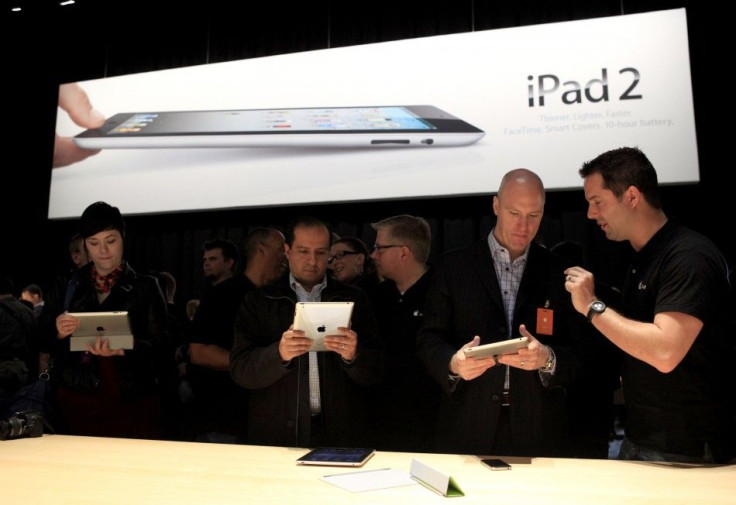Rivals Pressured as Apple unveils iPad 2

Just as other tablets began entering the market, Apple earlier this week unveiled the latest iteration of its iconic iPad, dealing what some experts see as a death blow to the prospects of rivals.
On Tuesday Apple Chief Steve Jobs introduced the world to the iPad2, a sleeker, faster follow-up to the original. The market sent shares of Research in Motion down 0.3 percent, and Motorola - whose Xoom tablet many anticipate to be the iPad's toughest rival - was down by over 4 percent.
The new iPad2 sports front and back facing cameras, more memory, and a faster processor, but despite the upgrades, the iPad2 comes in at the same price points as the previous model.
Experts view this as a major hurdle to the likes of the Xoom and RIM's Playbook. Apple's new device starts at $499, while Xoom tablets will run between $599 and $799. The price will prove to be a difficult barrier for rivals to overcome as Apple's cost advantages are inherent to its vertical integration.
While iPad2 sports a dual-core, speed processor, the design is handled in-house instead of contracted out. Moreover, the company can leave out retail markups as it can sell directly online or in its own brick-and-mortar stores.
Apple's more aggressive iPad cost-vs-price strategy leaves no premium umbrella for commodity vendors to undercut on a spec-for-spec basis Caris & Co.'s Robert Cihra told clients this week. Any vendor thinking they can match Apple on that basis is kidding themselves, he said.
While analysts at Detwiler Fenton have already characterized Xoom sales as extremely light, the Cupertino, California-based consumer electronics maker also sent shocks through Asia
Samsung, maker of the popular 7-inch Galaxy Tab tablet is now rethinking it's 10-inch debut in wake of Apple's announcement.
Regarding the planned release, Samsung executive Vice President Dong-joo Lee told Yonhap News on Friday that the company had to rethink parts that were inadequate, and addressed the price as well.
The 10-inch (tablet) was to be priced higher than the 7-inch (tablet), referring to Samsung's original Galaxy Tab, which sold for $600. We will have to think that over.
Ahead of the new iPad's launch, rivals aimed to out-competing Apple in terms of hardware. Nearly all competitors -- from the Xoom to HP's TouchPad -- feature dual-core processors compared to the iPad's single core. Some even have chips that will allow them 4G network capabilities.
These leaps in technology have, for the most part, been swept away with Apple's latest announcement.
While the Xoom and Playbook feature more powerful cameras on the front and rear, and the Touchpad has a slightly faster CPU, analysts characterize Apple's upgrades as good enough, according to JP Morgan's Mark Moskowitz.
Considering the competitive launches so far, with higher price points or clumsier form factor/technical specs, our assumption of Apple's tablet market revenue share at 68% in 2011 may be conservative, Moskowitz told clients following the iPad 2 launch.
Perhaps the biggest challenge for iPad competitors to overcome is Apple's software.
Our competitors are looking at this like it's the next PC market, Jobs said at the unveiling. These are post-PC devices that need to be easier to use than a PC, more intuitive. The hardware and software need to intertwine more than they do on a PC.
The iPad and the iPhone are both supported by droves of developers across the world, working on making the next 'app' that will take off. To date, Apple reported nearly 65,000 apps in its iTunes store for the iPad, while the Xoom numbers in the triple digits. RIM has a few thousand, it reports.
iPad 2 immediately obsoletes a flood of media tablets that are finally beginning to appear a year after the iPad's introduction, wrote Needham analyst Charlie Wolf.
Competitive tablets can emulate the hardware features of the iPad. But none can or probably never will match its software, Wolf concluded.
© Copyright IBTimes 2025. All rights reserved.




















